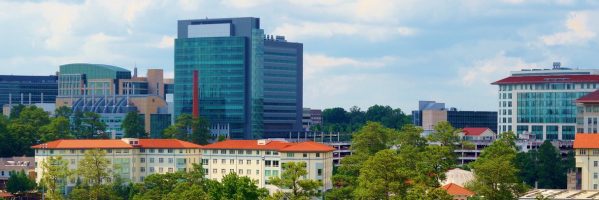Emory Goizueta Initiates Pilot Program to Enhance Global Immersion Experience

Globalization is a key feature of Emory University’s Goizueta Business School. There’s an eye on international business throughout the university, coming in many forms. In lectures, students spend hours pouring over case studies from around the world. In addition, 17 percent of the current Class of 2021 are international students representing 31 countries, and more than 20 exchange students and 31 international company-sponsored students enter the MBA program each year.
However, that doesn’t mean that there aren’t areas where Goizueta can improve. Recently, Goizueta Dean Erika James pointed out an often-overlooked global resource: collaboration. James’ goal is to create more opportunities for students when it comes to international immersion as well as partnership. Her strategic plan is to explore more global collaboration opportunities across all eight focal areas for the campus.
As part of this global expansion, Dean James plans to continue to increase awareness of the influence and impact of global business firms, particularly since students consistently interact with these foreign partners and are hired by them.
“There is nothing new about globalization; no one even talks about it anymore,” James said in a recent interview featured on the Goizueta website. “In fact, companies expect that students will be on global teams or will interact with an international clientele. I want to make sure we are doing all we can to prepare students for an increasingly interconnected world. While advances in technology and transportation make the world smaller, it is still a melting pot of rich cultural differences and varied business norms. Our students can’t afford to not be aware of as much detail as possible.” Continue reading…
San Francisco’s Top 3 Economics MBA Programs

When it comes to learning about economics, what better place than Silicon Valley?
San Francisco holds a number of schools that offer an MBA with a focus on economics. The Bay Area is not just a place of lax tech bros though. It’s a place booming with culture and treasures like the Golden Gate Bridge and the Pacific Coast Highway. The beach isn’t too far, either.
But if you are looking for a place to build a resume, San Francisco is it: It ranks among the nation’s best performing cities. San Francisco is also second among cities in the U.S. for GDP growth associated with tech firms.
While many schools in the area hold prestigious MBA programs, here are the top three for where to obtain an economics MBA.
Haas School of Business – UC Berkeley
The Hass School of Business at UC Berkeley has been around for nearly 30 years, since 1989. The Berkeley name itself holds a sense of prestige, but the Haas School even more so. It’s the oldest business school at a public institution. That’s something.
As for its MBA programs, the Haas School offers a full-time, Executive, and a part-time MBA, for which students can take classes in the evening or on weekends. The full-time MBA takes two years and includes a variety of focus areas students can do via electives. One area of focus is economic analysis and policy.
This focus gives candidates that economic edge needed to make it in the field. This focus starts from a student’s first year though the electives tend to become more dominant in the second year. The courses make up 60 percent of the curriculum. Some of these electives use a macroeconomic lens to look at the global economy. Others look at the housing and urban economy from the viewpoint of investors and real estate developers.
Recruiters have come to Haas from healthcare, internet, and solar companies. The program takes just 275 students a year. Those interested in the Haas School of Business must apply by Sept. 21.
Stanford University Graduate School of Business
The Stanford University Graduate School of Business came about after former U.S. President Herbert Hoover, a Stanford alum, helped created the business school in 1925. About 800 students are enrolled in the program at a given time. Sometimes, the program could hold half that size. The Class of 2018 enrollment featured more than 417 students.
The noted university offers a single, full-time MBA program. The business school ensures its curriculum is flexible to fit every student’s needs. By the end of their first quarter, students develop a personalized plan for their foundational courses. That way, they get the basics down before moving onto establish their focus with their experience and goals in mind.
For those interested in economics, Stanford offers two types of expertise: political economics and managerial economics. Here, students can learn about financial crises, contemporary economic policy, managing global political risk, and many more topics.
F.W. Olin Graduate School of Business – Babson College San Francisco
The F.W. Olin Graduate School of Business at Babson College’s San Francisco campus opened not too long ago, in 2011. It offers a unique blended learning program. Not all students can manage the time to come into a classroom. This program is flexible and blends online classes with in-person classes every seven weeks on Fridays and Saturdays.
Core classes get into the nitty gritty all business students need: financial reporting, managing talent, strategy, and others. But students also get the opportunity to take a series of Signature Learning Experiences that take students outside the classroom and into a hands-on learning environment.
Course topics vary from a myriad of things—and economics is among them. The core courses include one on managerial economics and another on how to apply data to economics. The school also gives economics classes about game theory, trade, globalization, and health economics.
Metro Jobs Report: Startup Experts, a De-Globalized World and more

Lets dig into the latest jobs news …
Rutgers Professor Unpacks Conflicting Globalization Views

Rutgers Business School recently explored the views of Management and Global Business Professor Farok J. Contractor, who unpacks the complex domestic and international impacts of globalization.
Urbanization And Populism Clash, Says Ted Rogers Faculty

There’s a wide gap between rural dwellers and city folks, explains Dr. Kim Bates, Director of MBA Programs at the Ted Rogers School of Management, and Dr. Steven Murphy, Dean of the School. This gap is apparent in the results of the U.S. elections, where “Trump supporters are those who have been left behind by globalization and digitization,” and are stranded in small communities where they cannot get gainful employment, states The Globe and Mail article. According to this populist politics narrative, universities pollute the minds of the young, filling them with new ideas that leave the past behind, and business schools play a major role in this. Continue reading…
The Global MBA Experience at London Business School

One of the primary social impacts of increasing globalism is the sense that world feels like it’s shrinking. But for business, that means there are opportunities for expansion unlike ever before. As it has become easier than ever to communicate and work together across vast distances, so too has it become more likely for organizations to grow their businesses. And according to a recent YouGov Survey, globalization is still seen as a force for good rather than bad in the world.
“Unsurprisingly, the countries that are the biggest enthusiasts of globalization are the ones that have benefited most from it—the poorer nations of East and South East Asia,” it explains. “Here, belief that globalization is a force for good reaches at least 70 percent in all countries …”
For that reason, it has become more important than ever for MBAs to gain a global perspective of business while in school. Not only do MBAs with global experience better understand the impact of language, culture, traditions, government, legal structures and politics on business, but they’re also more likely to be able to make use of opportunities that international markets present.
The Global MBA Experience
So, what makes an MBA program global? There are a few factors that go into it including:
- Diversity of students and faculty.
- International orientation of curriculum and course material.
- Employment and recruitment opportunities for graduates.
- Reach of the alumni network.
- Location of the school.
- Partner programs.
Global MBA programs tend to offer a level of international exposure for students and faculty that is not often seen within a traditional, local MBA program. This means that group projects and discussions aren’t based on a single viewpoint but rather reference a variety of regions and countries. These programs also typically include opportunities for additional learning in another country through exchange programs or geographically diverse recruiting partners.
And there’s no hiding the fact that a Global MBA experience benefits both students and companies. McKinsey & Co. analysis shows that companies with a more diverse workforce perform better financially than respective national industry medians. Harvard Business Review recently wrote on the topic as well, saying, “by correlating diversity in leadership with market outcomes as reported by respondents, we learned that companies with 2-D diversity out-innovate and out-perform others.”
Global Business Experiences at London Business School
It’s for this reason and many others that the London Business School has made globalization a priority. Gareth Howells, the Executive Director of MBA & MIF Education, explained it this way. “At London Business School, being global is in our DNA and informs everything we do. By further expanding our reach through the expansion of our global menu, we believe we can ensure our graduates create value and impact all over the world. Global talent is an integral part of today’s workplace with everyone seeking to create success in a multicultural environment.”
Not only is the London Business School 2018 MBA class made up of 70 nationalities, but the school is also about to add even more of a global experience to its MBA program thanks to their Global Business Experiences (GBEs). Each GBE is a week long program that consists of faculty briefings, guest speakers, site visits, workshops, panels, company visits and opportunities to engage with local LBS alumni in each region.
The GBE program gives students the opportunity to apply their academic learning in a real-life, global business environment and ensures students have the skills to constantly evolve their global mind-set. The goal of the program is to help MBAs flourish outside of their comfort zones and to gain familiarity and experience working with classmates and within organizations from different cultures and industries around the world.
The best part about the GBE is that no program is the same. Each experience changes with the location and the organization hosting the experience. Starting this August, MBAs at the London Business School will:
- Experience two new regions for the GBEs including Lima and Tel Aviv.
- Have additional language opportunities: Italian and Japanese have been added to LBS’ existing provision of French, Mandarin, German, Russian, Portuguese, Arabic and Spanish.
- Increase their knowledge with the Global Business Practice course supporting students with cultural awareness.
GBE Student Experience
Below are two student testimonials about the Global Business Experience at LBS.
“What appealed to me was the fact that this GBE had a component where I was working with an entrepreneur,” explained Jenny Troung, a 2013 MBA student who visited South Africa. “This meant that what I was doing in those five days was related to what I had been learning in the previous year. We helped the entrepreneur with his accounting to figure out if it is more profitable to sell a chair compared to an ottoman. And that was real business insight that I had to apply from School.”
“My GBE in Johannesburg was life changing,” described Marie Milleron, a 2015 MBA student. “Whether it was helping our township entrepreneur with the little resources she had, or understanding the challenges of a developing economy with a heavy past, it was a unique time of personal growth and reflection.”
To learn more about the GBE program at London Business School, visit the school website.
